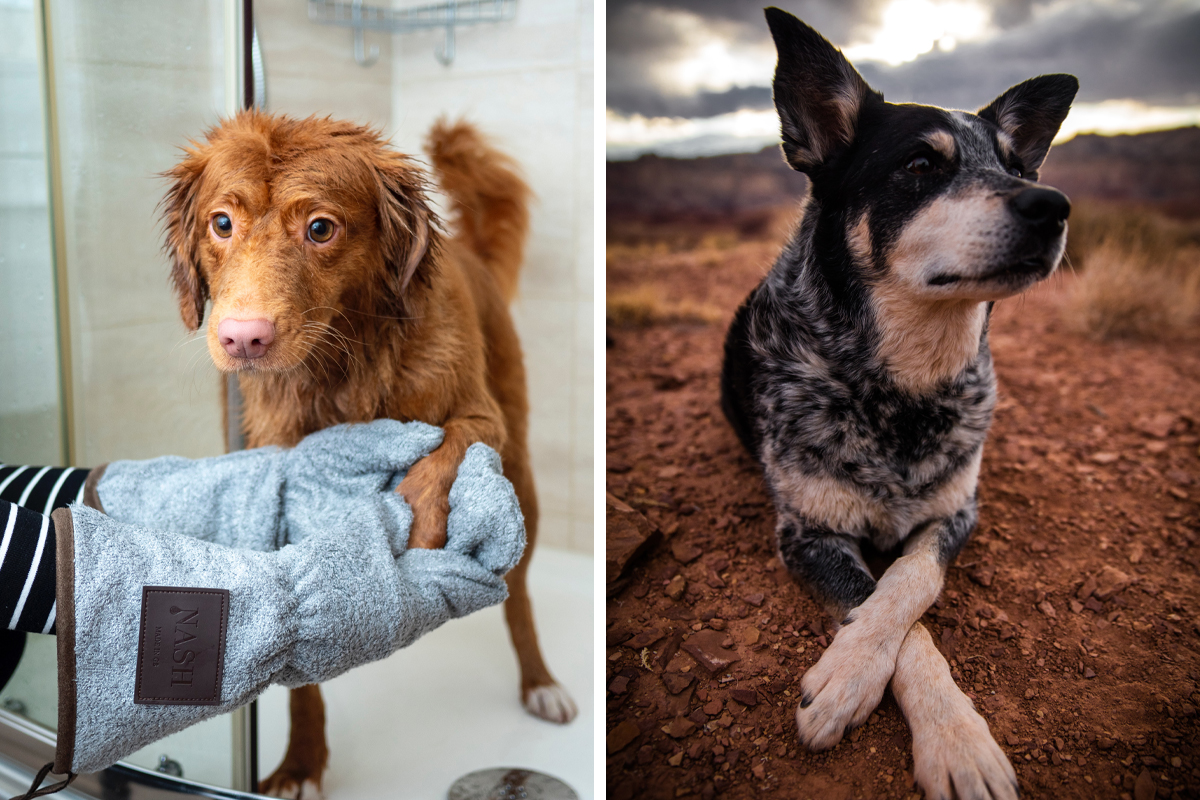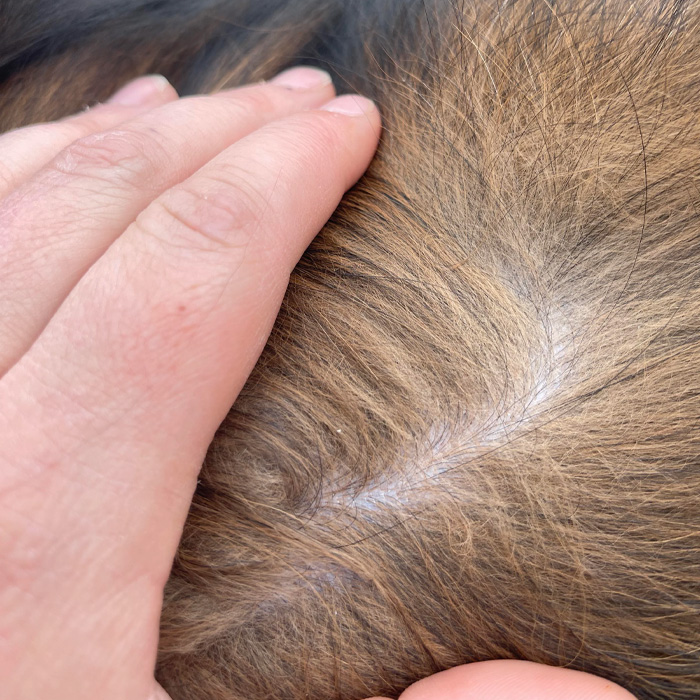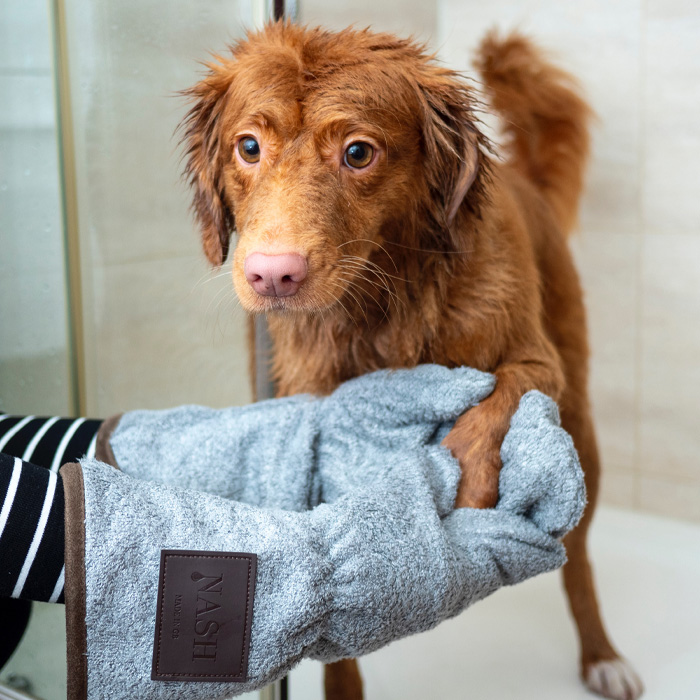Does your furry best friend have dry, flaky skin that’s driving them crazy with itching? Well, fear not, because we’ve got some tips and tricks to help soothe your pup’s parched skin and get them back to their happy, tail-wagging selves.
From switching up their diet to trying out some moisturizing treatments, we’ll explore all the things you can do to tackle dry skin in your canine companion. So, grab a treat, kick back, and get ready to learn about how to put an end to your dog’s desert-like skin.
- Skin symptoms in dogs include itching, dandruff, hair loss, and redness.
- Canine skin dryness can be caused by age, diet, grooming practices, and weather.
- Treat dog dry skin with vet advice, diet, hydration, and suitable supplements.
- Home remedies like oatmeal baths and apple cider vinegar soothe dog's dry skin.
- Prevent dog dry skin with regular vet visits, grooming, and ectoparasite control.
The information provided herein is for informational purposes only. Please refer to our disclaimer for more details..
- Symptoms of dry skin in dogs
- What are the causes of dry skin in dogs?
- How to treat dry skin on dogs
- Natural remedies: How to help dogs with dry skin at home
- Dietary fixes: What to feed your dog for dry skin
- How to prevent flaky skin in dogs
- Other common skin conditions in dogs
- Frequently asked questions
Symptoms of dry skin in dogs
Image source: Expensive-Anteater44
If your dog has dry skin, a characteristic sign is dandruff-like material on its coat as well as the bedding. These include itching, dandruff, hair loss, flaking skin, a dull coat, and in some cases, redness. Other signs of dry skin could include excessive shedding, scaling or scabs, and cracked skin.
Dogs with dry skin may also have different odors depending on what causes dry skin. This odor could be due to oil build-up, parasites, or a yeast infection. The symptoms seen in dogs that suffer from dry skin may vary from dog to dog.
What are the causes of dry skin in dogs?
Different things can lead to your dog’s skin being dry. Your dog’s dry skin could be caused by skin infections or adverse weather conditions. You may also be the cause of your dog’s dry coat and skin, as poor grooming practices and a poor diet could lead to skin problems.
Aging
Just like humans, as dogs age, they experience physical and behavioral changes. According to Veterinarians.org, older dogs have less active oil glands, and their skin is thinner. This eventually leads to a lack of moisture retention which contributes to dry skin. Older dogs are also prone to dry skin because their aging immune system is more prone to allergies and skin sensitivities.
Weather conditions
During the winter months and seasons with low humidity, dogs can suffer from dry skin due to the lack of moisture in the air. According to the Animal Rescue Site, the brutal winds, blasting indoor heaters, and super low humidity tag-team to suck the life out of your dog’s skin, leaving it as dry and flaky.
In the summer, dogs can get dry skin because of sun exposure and potential dehydration.
Poor diet
A diet lacking essential nutrients, including proteins, vitamins, and fatty acids, can contribute to skin problems in dogs. Inadequate protein or fat intake can result in flaky coats, while deficiencies in essential nutrients might hair loss.
Bad grooming practices
Bathing your dog too frequently can strip the skin of its natural oils and disrupt its moisture balance. Using harsh or unsuitable grooming products like shampoos can irritate the skin and may cause dryness and irritation.
Allergies and Parasites
Allergies, including food and environmental allergens, can result in dry, itchy skin in dogs. Fleas and ticks can lead to skin irritation, leading to dryness and discomfort for your pet.
Systemic disorders
Underlying health conditions are another potential cause of dry skin in dogs. Hormonal imbalances and metabolic disorders can manifest as skin issues in dogs.
How to treat dry skin on dogs
Image source: Jamie Street
If your dog’s skin or coat becomes dry, there are many ways to treat the condition. Many things could lead to dry skin in dogs and the treatment options for your dog’s dry skin depends on the cause. Here are a few things that you could do to treat your dog’s dry skin:
1. Consult your veterinarian.
If you suspect any skin condition, take your dog to the vet. The veterinarian can tell you about the potential causes of dry skin and help your dog with a suitable treatment plan. Your vet may suggest managemental changes like getting the right shampoo, a dog skin moisturizer, or even a humidifier.
Other treatment options may include immunotherapy and diet changes.
2. Provide a high-quality diet and proper hydration
A healthy dog needs a balanced diet rich in essential nutrients to promote healthy skin and coat. Look for dog foods with omega-3 and omega-6 fatty acids and ingredients like salmon, flaxseed, and fish oils. These are great for keeping your dog’s skin moist.
Good hydration is key for your pup’s skin! It keeps the moisture balanced, protects against dryness and outside factors, and helps skin cells do their job well. Plus, it keeps their coat from getting too oily and helps them stay cool when it’s hot out.
3. Give your dog supplements
Supplementing your dog’s diet with essential fatty acids and vitamins can improve skin health. Make sure to use supplements recommended by your licensed veterinarian.
Natural remedies: How to help dogs with dry skin at home
Home remedies for dry skin such as colloidal oatmeal baths, vitamin E oil, aloe vera, and apple cider vinegar can provide relief for dogs. Natural remedies for dry skin in dogs include:
Colloidal oatmeal bath
Many dogs with dry skin respond positively to an oatmeal bath. To make one, grind plain oats and mix them into warm water until a milky solution forms. Then, gently massage this solution into your dog’s skin and let your dog soak it in for 10 minutes before rinsing thoroughly.
Oatmeal’s soothing properties can help alleviate itching, moisturize the skin, and reduce inflammation, making it a great natural solution for dry skin in dogs.
Apple Cider Vinegar
This is a great remedy for your dog’s dry coat. Dilute it half and half with water and fill a spray bottle with this mixture. Apply it to itchy patches of skin on your dog a few times daily but be cautious around the eyes.
If your dog has broken skin, start with a milder solution, adding 1 tablespoon of apple cider vinegar to one cup of water. Additionally, consider using coconut oil, olive oil, or castor oil to soothe and heal affected areas, especially if the skin is broken. Note that the reaction to this product also varies from dog to dog.
Dietary fixes: What to feed your dog for dry skin
Introducing omega-3 fatty acids, such as fish oil, to your dog’s diet can help improve skin and coat health. Additionally, incorporating foods rich in antioxidants and essential vitamins can support skin hydration and repair.
How to prevent flaky skin in dogs
To prevent flaky skin, dog owners must strive to maintain healthy skin in their dogs. Let’s look at a few ways that you can protect the skin of your fur buddy.
1) Take your pet for regular vet checkups even if your dog looks healthy. This way you can identify underlying issues before they cause secondary skin infections.
2) Proper and regular grooming sessions are crucial to dog care. This helps remove dead skin cells and distribute natural oils across a dog’s coat.
3) Limit your dog’s sun exposure, especially in the summer, and ensure they remain well-hydrated to protect their skin from drying out.
4) Prevent fleas and ticks through appropriate preventive measures. According to PetMD, preventive pills, topicals, and collars are a great option for keeping ectoparasites away.
5) Regularly clean your dog’s facial folds to prevent moisture buildup in those areas. This is usually seen in breeds with wrinkles.
Other common skin conditions in dogs
In addition to dry skin, dogs can experience various other skin conditions such as dermatitis, eczema, and allergies, which require specific care and treatment based on the underlying cause.
Frequently asked questions
Does every dog get dry skin in the winter?
While dry skin isn’t synonymous with winter, the combination of cold, dry air, and artificial heating can contribute to skin dryness, making it a common issue during winter.
What causes dry flaky skin on dogs?
The main cause of flaky skin in dogs can be attributed to various factors. Dogs may have dry skin due to environmental conditions, diet, allergies, and underlying health issues.
My dog has dry skin. What can I put on my dog?
Moisturizing dog skin with natural ingredients such as coconut oil or shea butter can help hydrate and soothe flaky skin.
236views
Share on Facebook















-2
0